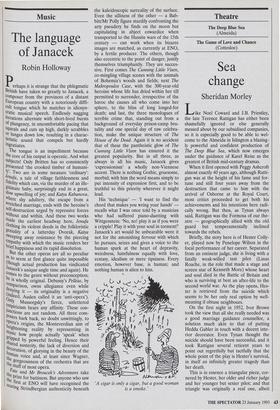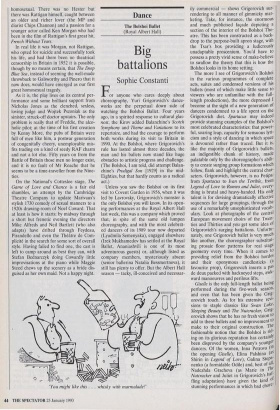Theatre
The Deep Blue Sea (Almeida) The Game of Love and Chance (Cottesloe)
Sea change
Sheridan Morley
Like Noel Coward and J.B. Priestley, the late Terence Rattigan has either been shamefully ignored or else generally messed about by our subsidised companies, so it is especially good to be able to wel- come to the Almeida in Islington a blazing- ly powerful and confident production of The Deep Blue Sea, which now emerges under the guidance of Karel Reisz as the greatest of British mid-century dramas.
When it first opened with Peggy Ashcroft almost exactly 40 years ago, although Ratti- gan was at the height of his fame and for- tune and still four years away from the destruction that came to him with the arrival of Osborne at the Royal Court, most critics proceeded to get both his achievements and his intentions here radi- cally wrong. But then, as Tynan always said, Rattigan was the Formosa of our the- atre — geographically allied with the old guard but temperamentally inclined towards the rebels.
Briefly, the story here is of Hester Colly- er, played now by Penelope Wilton in the focal performance of her career. Separated from an eminent judge, she is living with a fatally weak-willed test pilot (Linus Roache, in the role that made a stage and screen star of Kenneth More) whose heart and soul died in the Battle of Britain and who is surviving at best an after-life to the second world war. As the play opens, Hes- ter is retrieved from the suicide which seems to be her only real option by well- meaning if obtuse neighbours.
On the first night in 1952, Ivor Brown took the view that all she really needed was a good marriage guidance counsellor, a solution much akin to that of putting Hedda Gabler in touch with a decent inte- rior decorator. Even Tynan thought the suicide should have been successful, and it took Rattigan several reticent years to point out regretfully but tactfully that the whole point of the play is Hester's survival, in itself an infinitely greater tragedy than her death.
This is in essence a triangular piece, cor- nered by Hester, her older and richer judge and her younger but sexier pilot; and that triangle was originally a real one, albeit homosexual. There was no Hester but there was Rattigan himself, caught between an older and richer lover (the MP and diarist Chips Channon) and a passion for a younger actor called Ken Morgan who had been in the film of Rattigan's first great hit, French Without Tears.
In real life it was Morgan, not Rattigan, who opted for suicide and successfully took his life, and had there been no theatrical censorship in Britain in 1952 it is possible, though by no means certain, that The Deep Blue Sea, instead of seeming the well-made throwback to Galsworthy and Pinero that it now does, would have emerged as our first great homosexual tragedy.
As it is, the play lives on its central per- formance and some brilliant support from Nicholas Jones as the clenched, sexless, loving judge and Wojtek Pszoniak as the sinister, struck-off doctor upstairs. The only problem is really that of Freddie, the alco- holic pilot; at the time of his first creation by Kenny More, the pubs of Britain were full of men like him, a postwar generation of congenitally cheery, unemployable mis- fits trading on a kind of seedy RAF charm and not a lot else. Fifty years on from the Battle of Britain those men no longer exist, and it is no fault of Mr Roache that he seems to be a time-traveller from the Nine- ties.
On the National's Cottesloe stage, The Game of Love and Chance is a fair old shambles, an attempt by the Cambridge Theatre Company to update Marivaux's stylish 1730 comedy of sexual manners to a 1920s drawing-room of Noel Coward. That at least is how it starts: by midway through a short but frenetic evening the directors Mike Alfreds and Neil Bartlett (who also adapts) have drifted through Feydeau, Pirandello and even the Theatre de Corn- plicite in the search for some sort of overall style. Having failed to find one, the cast is left to camp around as best they can, with Stefan Bednarczyk doing Cowardly little improvisations at the piano while Maggie Steed chews up the scenery as a bride dis- guised as her own maid. Not a happy night.



























































 Previous page
Previous page